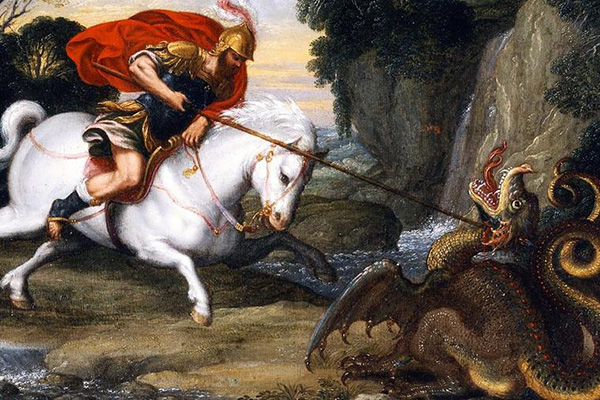For England and St. George
Gregory Hood, American Renaissance, April 24, 2025
Subscribe to future audio versions of AmRen articles here.
Yesterday was St. George’s Day — or something close to it. It is technically next week because the Church of England says a feast day cannot be within a week of Easter. Nonetheless, in political terms, St. George Day’s was yesterday for post-Christian England, and like everything else, it is a political battleground.
Prime Minister Keir Starmer said of the English flag: “It belongs to all of us, to England in all of its wonderful diversity. And we should be proud of that flag and we must never concede it because it’s an expression of our values and our patriotism.”
Who’s “we?” Apparently, everyone. The press widely interpreted the Prime Minister’s comments as an attack on Nigel Farage. “I’m very concerned that we have whole areas of our towns and cities that are unrecognizable as being English,” Mr. Farage said recently. However, because he must always hedge, Mr. Farage says these areas are not “unrecognizable as being English because of skin color,” but because of “culture.” We can groan, but Mr. Farage probably thinks his approach is right. A new poll found Reform outperforming both Labour and the Tories.
Insisting it is all about “culture” means everyone should be able to adopt any culture. This is especially easy to do if English culture is not connected to any religion or exclusionary belief. If English culture is “diversity” and English values are “democracy and tolerance,” it’s no trick to be English. Everyone in the world is potentially English. Naturally, this is the same way progressives talk about American identity, and why an illegal immigrant deported to El Salvador is actually a “Maryland man.”
Thus, St. George’s Day is being used for citizenship ceremonies and articles praising diversity. None of the people featured in the article are “English” by ethnicity, but if Englishness is just about a flag, who cares? In fact, even those of English descent in the United States are less English than those who hold a passport, in the same way that Italy welcomes non-whites to become citizens but no longer wants ethnic Italians from abroad.
Keir Starmer’s comments suggests the contradictory nature of his approach. “There are people trying to sow division in our communities, people taking the red and white of our flag . . . as they throw bricks at businesses,” he said. He was talking about the Southport riots, by which outraged Englishmen protested murders committed by a non-white. The government reacted with staggering repression, imprisoning people for social media posts. Yet this may be necessary in a multicultural country that no longer has a core population and is instead just “communities” jostling each other.
Many of these “communities” hate each other, such as pro-Israel Jews and pro-Palestinian Muslims, a conflict that is already ripping Labour apart. With tensions rising between India and Pakistan, that is the next foreign conflict coming to English streets. If the white Christian English begin taking their own side, the system probably cannot survive. This is why Christians are relegated to just another “community,” rather than the people who built the kingdom. Thus, the Prime Minister claims the English flag belongs to everyone because England is characterized by “wonder and diversity.”
English culture is quite easy to define. It is the culture that the English — a white ethnic group mostly derived from the Anglo-Saxons who conquered the country after the Romans — created. Their institutions become not just meaningless but destructive if they are not defined and run by the English themselves. Sadiq Khan says Englishness is defined by values, including, among other things, “democracy.” If that’s true, no one was English until recently, because England had a ruling class that clearly loved it more than do today’s “democrats.”
From Shakespeare to Wembley, queueing to Sunday roasts—being English means many things. But at its heart, it’s about standing up for what we believe in: democracy, fairness, decency and respect.
This St George’s Day, let’s celebrate all it means to be English. pic.twitter.com/MWZ4HtWdBF
— Mayor of London, Sadiq Khan (@MayorofLondon) April 23, 2025
Every year, leftists tell us St. George was “Turkish” and that England’s national day is thus not really about England at all. They are admitting more than they know. St. George was a Roman soldier, probably of Greek descent, who probably served in the third or fourth century before being martyred. What we now call Turkey was part of the Greek world and was not occupied by Turks until after the Battle of Manzikert in 1071, which led to the loss of Anatolia from the West.

“St. George Defeating the Dragon”
In other words, St. George is a symbol of ethnic replacement. The culture he was a part of, the religion he championed, and the empire he served all faded when a different group took over. St. George means something to England and to Christians, but not much to Turkey because it is now part of a different civilization. And England’s heroes and history will become meaningless to England itself as it is repopulated by foreigners. St. George’s Day is not just a day for the English. It is also a reminder to all whites that culture comes from race — and when race goes, culture goes.















